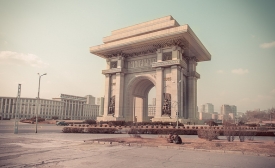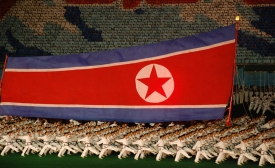north korea

A look back at public diplomacy with North Korea, from Dennis Rodman to the BBC.
On a quiet midweek evening on the streets of the Cambodian capital, the Pyongyang Restaurant is at near capacity. Inside the square room, adorned with dramatic landscape murals, music starts to blast. Waitresses in bright traditional Korean garb drop their trays and pick up their instruments. With great skill they twirl in formation and belt out odes to the homeland. It is patriotic, unapologetic North Korea thousands of miles from the secretive state.
A hard-line strategy is not likely to persuade the DPRK regime to give up its missiles and nuclear weapons. Nor will it garner the support of the South Korean public, which is poised to elect a centrist or center-left president in the May 9 election. Most importantly, preemptive strikes or enhanced sanctions will delay ongoing economic reforms in North Korea and set back its integration into the global economy. Internal economic and social change is ultimately the only path to moderate the DPRK regime and its policies.
“North Korea now has the goal of developing the nuclear weapons by itself and also pursues other conflicting goals like improving the economy and foreign relations,” MOU spokesperson Lee Duk-haeng told media at a regular news briefing. [...] Cheong added that the members of the organization have been key figures in negotiations with the South, U.S. Diplomacy, and public diplomacy.
A horde of foreign fun-runners took to the streets of Pyongyang on Sunday for an annual marathon that has become one of the North Korean capital's most popular tourist events. Officially called the Mangyongdae Prize International Marathon, the race became an instant hit with tourists looking to run in possibly the world's most exotic locale when it was opened up to amateur foreign runners in 2014.

In North Korea, nation branding is about security, not attraction.

Markos Kounalakis on the conflation of entertainment and real life politics.
North Korea's current foreign policy is based around only two things -- surviving and respect. "Ultimately they want to be recognized as a nuclear power and then reset their relations with some of their antagonists, South Korea and then the US, as a nuclear power," he said.







